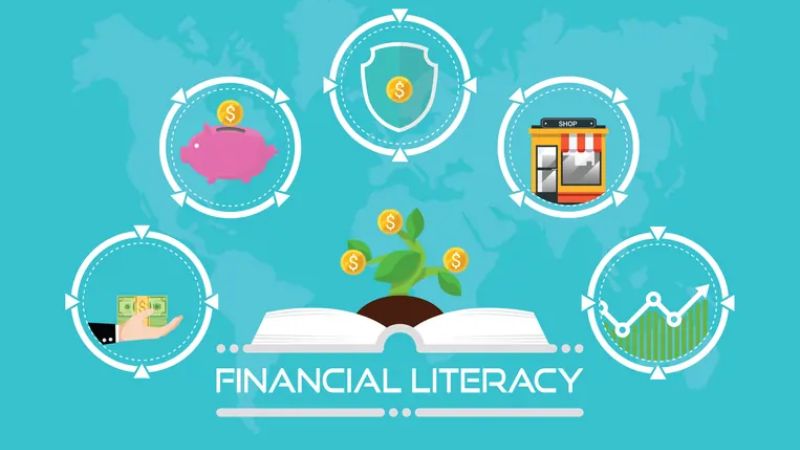In today’s complex economic environment, financial literacy is more crucial than ever. Understanding how to manage your finances effectively can significantly impact your quality of life, helping you achieve your financial goals and secure a stable future. This comprehensive guide aims to provide you with the essential knowledge and tools to navigate the world of personal finance confidently.
What is Financial Literacy?
Financial literacy refers to the ability to understand and apply various financial skills, including personal financial management, budgeting, and investing. It involves being knowledgeable about financial principles and concepts such as financial planning, compound interest, debt management, and the mechanics of credit.
The Importance of Financial Literacy
- Empowerment and Confidence: Financial literacy empowers individuals to make informed decisions regarding their finances. This confidence can lead to better financial stability and less stress about money.
- Improved Financial Planning: With a solid understanding of financial concepts, you can create realistic financial plans, set achievable goals, and make informed choices about investments and savings.
- Debt Management: Financial literacy helps you understand how debt works and how to manage it effectively, preventing you from falling into financial traps and maintaining a healthy credit score.
- Informed Investment Decisions: A good grasp of financial literacy enables you to evaluate investment options critically, ensuring your money works effectively for you.
Key Components of Financial Literacy
Budgeting
Budgeting is the cornerstone of financial literacy. It involves creating a plan to manage your income and expenses. A well-structured budget helps you allocate your resources efficiently, ensuring you can cover your essential needs while saving for future goals.
- Track Your Income and Expenses: Begin by recording all your sources of income and categorizing your expenses. This practice helps you identify areas where you can cut costs and save more.
- Set Financial Goals: Define short-term and long-term financial goals. This could include saving for a vacation, buying a home, or preparing for retirement.
- Create a Budget Plan: Allocate funds to different categories based on your financial goals. Ensure you include savings and emergency funds as part of your budget.
- Monitor and Adjust: Regularly review your budget to track your progress and make necessary adjustments. This helps you stay on course and adapt to any changes in your financial situation.
Saving and Investing
Saving and investing are critical aspects of building wealth and ensuring financial security.
- Emergency Fund: Set aside a portion of your income to create an emergency fund. This fund acts as a financial safety net, covering unexpected expenses without derailing your budget.
- Understanding Investment Options: Familiarize yourself with different investment options such as stocks, bonds, mutual funds, and real estate. Each investment type has its risks and rewards, and understanding these can help you make informed decisions.
- The Power of Compound Interest: Take advantage of compound interest by starting to invest early. Compound interest allows your money to grow exponentially over time, significantly increasing your wealth.
Debt Management
Managing debt effectively is crucial for maintaining financial health.
- Know Your Debts: List all your debts, including the interest rates and minimum payments. Understanding your debt profile helps you prioritize which debts to pay off first.
- Debt Repayment Strategies: Implement strategies such as the debt snowball (paying off smallest debts first) or debt avalanche (paying off highest interest debts first) to reduce your debt efficiently.
- Avoiding Bad Debt: Be cautious with high-interest debts like credit cards and payday loans. Only borrow what you can afford to repay and always strive to pay off your balances in full each month.
Credit Management
Your credit score is a vital part of your financial health. It impacts your ability to borrow money, rent an apartment, or even get a job.
- Understanding Your Credit Score: Learn about the factors that affect your credit score, such as payment history, credit utilization, and length of credit history.
- Building Good Credit: Pay your bills on time, keep your credit card balances low, and avoid opening too many new accounts at once.
- Monitoring Your Credit: Regularly check your credit report for inaccuracies and signs of fraud. You are entitled to a free credit report annually from each of the three major credit bureaus.
Retirement Planning
Planning for retirement is essential to ensure you can enjoy your golden years without financial worries.
- Start Early: The earlier you start saving for retirement, the more time your money has to grow. Utilize employer-sponsored retirement plans like 401(k)s or individual retirement accounts (IRAs).
- Understand Retirement Needs: Estimate how much money you will need for retirement based on your desired lifestyle and potential medical expenses.
- Diversify Your Portfolio: Spread your investments across different asset classes to reduce risk and enhance growth potential.

Building Financial Literacy
Educational Resources
- Books and Online Courses: Numerous books and online courses are available to help you build your financial knowledge. Look for reputable sources that cover topics ranging from basic budgeting to advanced investing.
- Financial Advisors: Consider consulting with a financial advisor to get personalized advice and guidance tailored to your financial situation and goals.
Practical Applications
- Practice Budgeting: Use budgeting apps and tools to manage your finances effectively. Regularly review your spending habits and make adjustments as needed.
- Invest Regularly: Commit to investing a portion of your income regularly. This disciplined approach helps you build wealth over time.
- Stay Informed: Keep up with financial news and trends. Understanding the economic landscape can help you make informed decisions about your money.
Conclusion
Achieving financial literacy is a continuous journey that requires dedication and a willingness to learn. By understanding and applying the principles of personal finance, you can take control of your financial future, make informed decisions, and achieve your financial goals.




istanbul temizlik şirketi | Say goodbye to dirt and grime with Cleaning Company Istanbul. Our team goes above and beyond to provide cleaning services that guarantee a hygienic environment.